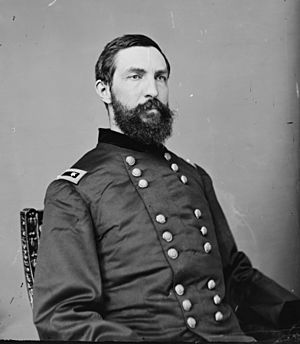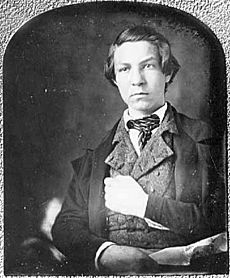Christopher Columbus Andrews facts for kids
Quick facts for kids
Christopher Columbus Andrews
|
|
|---|---|

Christopher Columbus Andrews
|
|
| Born | October 27, 1829 Hillsborough, New Hampshire |
| Died | September 21, 1922 (aged 92) Saint Paul, Minnesota |
| Place of burial |
Oakland Cemetery, Saint Paul, Minnesota
|
| Allegiance | United States of America Union |
| Service/ |
United States Army Union Army |
| Years of service | 1861–1866 |
| Rank | |
| Commands held | 3rd Minnesota Volunteer Infantry Regiment |
| Battles/wars | American Civil War |
| Other work | Ambassador to Sweden and Norway |
Christopher Columbus Andrews (born October 27, 1829 – died September 21, 1922) was an important American figure. He was a soldier, a diplomat, a writer, and a pioneer in protecting forests. He lived a long life and made many contributions to his country.
Contents
Early Life and Learning
Christopher Columbus Andrews was born in Hillsborough, New Hampshire. His father was a farmer. He went to school during the winter months. In 1843, he moved to Boston.
He later attended the Francestown Academy. After finishing his studies, he began to learn law in Cambridge, Massachusetts, in 1848. Two years later, he passed his law exam. He then started his own law office in Newton, Massachusetts. He also served on the city's school board.
In 1854, he moved west to Kansas. He worked in Washington, D.C., for two years. He helped promote Kansas's interests in the United States Congress. He also worked as a law clerk in the United States Department of the Treasury.
He moved to St. Cloud, Minnesota, in 1856. Three years later, he was elected to the Minnesota Senate. This meant he helped make laws for Minnesota. Before the Civil War, he also started a newspaper. It was called the Minnesota Union. He was its editor before he joined the army.
A Soldier in the Civil War
When the American Civil War began, Christopher Columbus Andrews joined the Union Army. He started as a private soldier. But he quickly moved up in rank. He became a Captain in the 3rd Minnesota Volunteer Infantry Regiment.
In July 1862, Confederate soldiers captured him in Tennessee. He was a prisoner of war until October. After being exchanged, he returned to his regiment. He was now a Lieutenant colonel. He fought in the important Vicksburg Campaign.
By July 1863, Andrews was promoted to Colonel. He led a group of soldiers called a brigade. They helped capture Little Rock, Arkansas. He also worked to support Union loyalists in Arkansas. His efforts helped Arkansas become a free state.
He was promoted to Brigadier general for his leadership. Later, he commanded a division of soldiers. He took part in the attack on Fort Blakely in Alabama. On March 9, 1865, he was given the honorary rank of Major General. He was then put in charge of the Mobile area.
After the War: Diplomat and Forester
After the Civil War ended, Andrews helped with Reconstruction in Houston, Texas. This was the time when the country was rebuilt. He helped keep order as a new government was formed. He left the army on January 15, 1866.
President Grant appointed him as a diplomat. He became the United States Minister to Sweden and Norway. He served in this role from 1869 to 1877. Later, he was the United States Consul-General to Brazil. This was from 1882 to 1885.
Andrews was very interested in protecting forests. He wanted people to log responsibly. He also wanted better forest practices. At first, not many people listened. But after the Great Hinckley Fire in 1894, people paid attention. This huge fire burned many towns in Minnesota.
He believed that proper forestry could help forests grow back. It could also make them safer from fires. Over time, his ideas became popular. Foresters and companies started using his methods. He was Minnesota's state Forestry Commissioner during the Baudette Fire of 1910. This fire further proved his point about needing forest rules.
He also wrote several books. These included a History of the Campaign of Mobile (1867). He also wrote Brazil, Its Conditions and Prospects (1887).
Personal Life
Christopher Columbus Andrews married Mary Baxter in December 1868.
 | James B. Knighten |
 | Azellia White |
 | Willa Brown |


